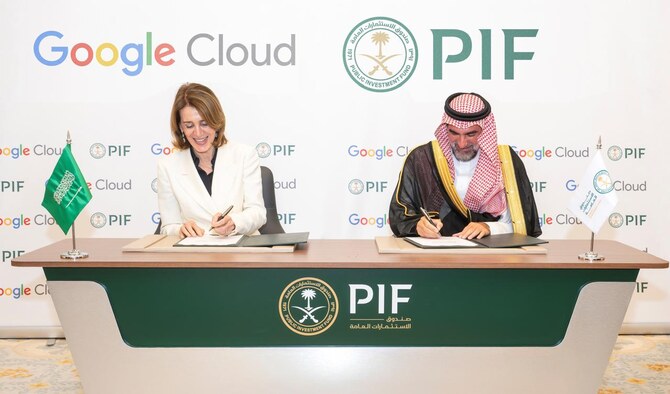RIYADH: Saudi Arabia’s Public Investment Fund has formed a strategic partnership with Google Cloud to establish an advanced artificial intelligence hub near Dammam in the Eastern Province.
This AI center will create thousands of jobs, contribute $71 billion to Saudi Arabia’s gross domestic product over the next eight years, according to a press release.
The agreement, signed during the eighth Future Investment Initiative in Riyadh, supports Saudi Arabia’s ambition to become a regional tech hub by the end of the decade.
The technology sector is one of PIF’s priority investment areas, serving as a crucial enabler for other sectors in the economy, including entertainment, financial services, healthcare, transport and logistics, utilities, and renewables.
“This partnership demonstrates PIF’s dedication to fostering an AI-friendly environment through investments in human capital and technology, upskilling thousands with cutting-edge tools to support our sustainable and innovative infrastructure goals,” said Yasir Al-Rumayyan, governor of PIF.

Saudi Arabia is hosting the eighth edition of the Future Investment Initiative summit in Riyadh. AN/Abdulrahman bin Shalhuob
He added: “Saudi Arabia is a prime location for global tech partners as PIF brings both sector expertise and a long-term approach to investment.”
The partnership will provide AI training for millions of Saudi students and professionals, supporting the national objective of expanding the information and communication technology sector by 50 percent. Through Google Cloud’s technology, industries will have enhanced access to AI applications, enabling growth and capacity building.
The agreement, subject to regulatory approvals, also includes joint research on Arabic language models and Saudi-specific AI applications.
“This strategic partnership will accelerate the adoption of AI in the local language and across industries — including health care, retail, financial services and more — for enterprises and startups in Saudi Arabia, across the Middle East, Africa and around the world,” said Ruth Porat, president and chief investment officer of Alphabet and Google.
To advance Arabic-language models, PIF and Google Cloud plan to enhance the Arabic-language capabilities of Gemini, Google’s generative AI model family, by integrating additional Arabic datasets with Google Cloud’s technology.
PIF stated that this collaboration will allow local businesses and developers to incorporate these models into their systems, enabling them to build advanced AI agents and applications tailored to Arabic language use.
“As part of Saudi Arabia’s rich technology ecosystem, we aim to create highly-skilled jobs for Saudis and opportunities for global businesses to fuel growth through cloud adoption,” added Porat.




























